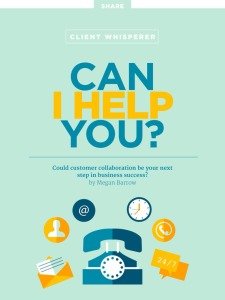Can I help you?
Could customer collaboration be your next step in business success?
 I have a friend who loves running. She loves competing in events on her own with no one determining her success but her self.Me, I love training as a team. I don't care if I win. It's about the camaraderie and completing an event together.
I have a friend who loves running. She loves competing in events on her own with no one determining her success but her self.Me, I love training as a team. I don't care if I win. It's about the camaraderie and completing an event together.
Competition and collaboration; not one is better, just different ways of working towards success.
There are businesses who determine success by being the market leader, winning the most customers within their industry. They use marketing to tell people what to do and have generic customer service. On the flip side, there is a growing number of businesses who determine success on getting the best outcomes for their customers. They want to affect positive change within their industry. Their marketing tells stories and encourages interaction and customer service is about listening and personalising help. As I was trying to sort out internet connection to submit this very article, the large telecommunication corporation I was dealing with, in their mind, was solving my problem of a disconnected account. They had lots of answers. They through their checklist and scattered me with generic advice. My problem remains unresolved.
But, I know this organisation defines its success on profits for its shareholders. I know they don't really care about my feelings about their service.
If they were a collaborative business they would have made the effort to help me before giving me a problem -- contact me before they deactivated my account. They would have made it easy for me to be a customer by doing the thinking for me, having listened to why I bought their product and knowing I have too much to remember in my life. And if I contacted them, if all else failed, they would listen to me like a valued customer - maybe even as a member of their community - and consider if making a change may help other customers. There is a growing momentum of people searching for businesses who want to do better, thoughtful work; who listen and care about their industry. In today's digital age, prospects are accessing your interactions with customers, or lack thereof, making judgments and decisions about how your deliver your purpose and values with customers. With Social Media we can be informed prospects, able to make buying decisions determined on matching values. Asking for feedback and conducting customer surveys is a strategy long used by businesses to uncover how we, your customer, value your service. It can also help customers feel a part of your business' community. But it can just as easily be counterproductive if you are not willing to engage in responses, detail findings and be willing to tweak your behaviour.
This is where business can often get customer collaboration wrong.
Collaboration makes me feel part of your community. I shouldn't be asked how to run your business, that's for you to work out. Instead ask (and care about) how you make me feel when I use your product or service.
The telecommunication business asked me to fill in a survey. I didn't feel like they were collaborating or that my voice would be heard or that I would ever see a change. I knew it was simply their 'closing the loop' on my customer enquiry. It is ok to be a "business is business" business. For me, though, I ache for businesses that have the courage to let me into their world; who tell their stories. It is what connects us as humans. When I recently went through a miscarriage, I was searching for stories of other businesswomen who had gone through same -- how did they cope with grief and business? I hardly found anything. So which much trepidation I posted my story on my business' Facebook page and Instagram. It was the most commented post, with overwhelming responses of gratitude for sharing so others could share their story.
Collaboration or letting people feel connected with my story? Whatever it was, it confirmed the hunger for community -- business owner opening up to her tribe.
This article first appeared in Aspire Magazine, March 2015 issue.
